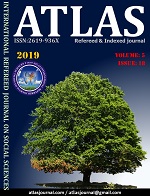TATAR LANGUAGE AND HISTORY IN THE RUSSIAN SOURCES
DOI:
https://doi.org/10.31568/atlas.303Keywords:
Tatar Turkish, Kazan Tatars, Russian sources, LanguageAbstract
Language is one of the most important elements that make up the nation it belongs to. Every nation has its own language, it reflects the language culture. Language is an accumulation gained at the end of a process. This process can be a historical process as well as a human life. The historical development of language is the one that expresses the historical process of change. Every nation has its own language, it reflects the language culture. Turkish, which is one of the most well-established languages of the world, has been widely used due to the spread of Turkish societies in a wide geography. Tatar Turkish, which is one of the sub-branches of Turkish, is an important dialect among the Turkish languages because the Tatars have a long history. The Kazan Tatars are a society that loves to praise themselves by saying son We are nation of nation da, ”We are nation with books lı, and they deserve this until the end. Kazan Tatars have been one of the leading communities of the Turkic World for many years. Civilization, science, art, literature, history, the scientists of the branches, world-renowned authors, politicians and the Turkish World has earned important names. At the same time, Kazan University is one of the oldest universities in Idil-Ural region. In this study, Tatar language and history of Russian sources were examined and examined through this source. Study the "Introduction" section gives general information about the Tatars were given information about removing books on the subject of research in Turkey Turkish and Tatar. Our study was divided into 3 periods. In the first semester, Tatar Turkish was given information about the first exit and using balls. The effects of the 2nd period of Kazan Khanate and the works written were explained. In the last period, changes in language have been included with the changes in the alphabet and the influence of Russian.
Downloads
Published
How to Cite
Issue
Section
License

This work is licensed under a Creative Commons Attribution-NonCommercial 4.0 International License.


